|
Points: 18561416 Followers
NoirdameAdd Noirdame as a friendNoirdame will be notified and will have to accept this friendship request, to view updates from Noirdame and their ratings you must follow them. |
Lists
|
2 votes
Favorite Actors & Actresses
(232 items)Person list by Noirdame Last updated 1 year, 3 months ago
8 votes
Brown-Eyed Men Are Adorable
(65 items)Person list by Noirdame Published 9 years, 9 months ago
 2 comments
2 comments |
Recent reviews
I Walk the Line review
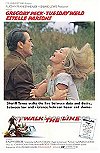 Posted : 8 years, 9 months ago on 24 July 2015 06:21
(A review of I Walk the Line)
Posted : 8 years, 9 months ago on 24 July 2015 06:21
(A review of I Walk the Line)Not to be confused with the 2005 Johnny Cash biopic "Walk The Line", this 1970 film directed by John Frankenheimer tells the story of a middle-aged, small-town sheriff, Henry Tawes (Gregory Peck) , who finds himself becoming increasingly disillusioned with his life as a husband and father, and coming to resent his humdrum existence. It could also be argued that he is entering a mid-life crisis, and one day, he stops the daughter of a local moonshiner (played by Ralph Meeker), pretty Alma McCain (Tuesday Weld) and her younger brother for driving without a permit. Captivated by her beauty, he begins a secret affair with her, all the while turning a blind eye to her family's illegal activities. Things become increasingly out of hand as inspectors begin to investigate the goings on in town and Henry's devious deputy (Charles Durning) discovers the liaison and the McCain family's profession. Henry also finds his distraught wife (Estelle Parsons) has also discovered the affair, and he decides to throw all caution to the wind and run away with Alma. Torn between her affection for Henry and her loyalty to her family, Alma's choice and Henry's recklessness result in tragedy and heartbreak.
This movie was very much overlooked when it was first released, but it is a good flick and the performances are superb. The production was shot mainly on location in Tennessee and Johnny Cash provides the soundtrack. This role was a very different one for Gregory Peck, especially at this stage of his career, but he embodies the tightly-wound sheriff expertly. Tuesday Weld is convincing and captivating as a young woman caught in a way of life that not only limits her opportunities but also her choices. Used by her father to keep Henry smitten in order to keep the family business secret, she makes the only choice she feels she can make, but not without cost to Henry.
Columbia released the movie on DVD a few years back, and it is unforgivably very bare-bones (there isn't even a menu), but it is in widescreen and the transfer looks wonderful, capturing the bleak yet lush countryside.
If you're a fan of Gregory Peck and Tuesday Weld, this is a film that must be viewed.
This movie was very much overlooked when it was first released, but it is a good flick and the performances are superb. The production was shot mainly on location in Tennessee and Johnny Cash provides the soundtrack. This role was a very different one for Gregory Peck, especially at this stage of his career, but he embodies the tightly-wound sheriff expertly. Tuesday Weld is convincing and captivating as a young woman caught in a way of life that not only limits her opportunities but also her choices. Used by her father to keep Henry smitten in order to keep the family business secret, she makes the only choice she feels she can make, but not without cost to Henry.
Columbia released the movie on DVD a few years back, and it is unforgivably very bare-bones (there isn't even a menu), but it is in widescreen and the transfer looks wonderful, capturing the bleak yet lush countryside.
If you're a fan of Gregory Peck and Tuesday Weld, this is a film that must be viewed.
 0 comments, Reply to this entry
0 comments, Reply to this entry
No Place to Hide review
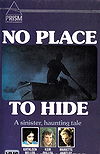 Posted : 8 years, 9 months ago on 8 July 2015 02:17
(A review of No Place to Hide)
Posted : 8 years, 9 months ago on 8 July 2015 02:17
(A review of No Place to Hide)One dreary afternoon a few years ago, I happened to be flipping channels when this movie aired on A&E, and I was glued to it the entire running time. It is quite dated, to be sure, but the thrills come from actual suspense and some subtle hints, which make more graphic TV movies more obvious.
Kathleen Beller is exceptional as Amy, the heroine, who is menaced by a stranger in a ski mask. The problem is, no one believes her, and her stepmother Adele (a masterful Mariette Hartley) begins to think that her stepdaughter is on the verge of a nervous breakdown. Amy is seeing a psychiatrist, portrayed by Keir Dullea, who thinks her father's tragic death may be the cause of any hallucinations Amy may be having. Twists and turns abound as Amy begins to wonder if she really is losing her mind, or is the stalker flesh and blood real? Gary Graham does an excellent job portraying her mysterious love interest, David. Let's just say that things are not what they seem, and we have an array of possible suspects. A girl can't trust anyone anymore! With her large, beautifully haunted eyes, Beller is perfectly cast as the terrorized young artist/heiress, and she gave an equally excellent performance as a rape victim in the TV movie "Are You In The House Alone?" (1978). Hartley's portrayal is superbly mastered with conflict. Dullea, in one of his many subtly creepy turns, fits the bill, while Graham embodies his elusively seductive character expertly.
Don't miss it if it airs on TV again, and a DVD release should be in consideration!
Kathleen Beller is exceptional as Amy, the heroine, who is menaced by a stranger in a ski mask. The problem is, no one believes her, and her stepmother Adele (a masterful Mariette Hartley) begins to think that her stepdaughter is on the verge of a nervous breakdown. Amy is seeing a psychiatrist, portrayed by Keir Dullea, who thinks her father's tragic death may be the cause of any hallucinations Amy may be having. Twists and turns abound as Amy begins to wonder if she really is losing her mind, or is the stalker flesh and blood real? Gary Graham does an excellent job portraying her mysterious love interest, David. Let's just say that things are not what they seem, and we have an array of possible suspects. A girl can't trust anyone anymore! With her large, beautifully haunted eyes, Beller is perfectly cast as the terrorized young artist/heiress, and she gave an equally excellent performance as a rape victim in the TV movie "Are You In The House Alone?" (1978). Hartley's portrayal is superbly mastered with conflict. Dullea, in one of his many subtly creepy turns, fits the bill, while Graham embodies his elusively seductive character expertly.
Don't miss it if it airs on TV again, and a DVD release should be in consideration!
 0 comments, Reply to this entry
0 comments, Reply to this entry
Family of Strangers review
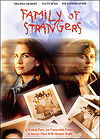 Posted : 9 years, 10 months ago on 21 June 2014 01:27
(A review of Family of Strangers)
Posted : 9 years, 10 months ago on 21 June 2014 01:27
(A review of Family of Strangers)Count me in as someone else who is glad this movie has made it to DVD. I taped it several years back as well and it really is a very underrated TV movie. Melissa Gilbert and Patty Duke always work very well together; they have a respect and ease with each other that comes off on screen. The film was shot on location in British Columbia and many Canadian actors are featured. It is also based on a true story from the book "Jody" written by Jerry Hulse. As I have not read it, I don't know what liberties were taken with it for this TV drama.
***Some Spoilers Herein***
Julie (Gilbert) is a young mother who is separated from her husband Sam (Eric McCormack, looking very young and sporting a believable American accent), and is living in Seattle with her daughter Megan (the late Ashleigh Aston Moore, who then went by Ashley Rogers) and her recently widowed father Earl (William Shatner).
One day while driving to work, Julie suffers a blockage in her brain and requires surgery, but she must find out if there is a history of strokes in her family. When she asks Earl for information on their family medical history, he reveals that she was adopted as an infant and he has no idea who her biological parents were. This sends Julie reeling and she sets out to discover her true parentage - after all, her life is at risk. A researcher, she discovers her birth mother came from Cloverton, British Columbia. When she tracks down Beth (Patty Duke), at first she meets with resistance and then a painful truth - Beth does not know the identity of Julie's father because she was raped. The women form a bond as they work together to uncover the rapist's identity - all Beth knows for certain is one of the boys who were in her circle of friends was the perpetrator, but as the rape occurred on a dark night following a homecoming dance in 1964, the pair must investigate and try to track the now grown men down. The identity of Julie's father and Beth's rapist is quite a surprise - at least it was to me. A few red herrings appear to throw the viewer off, making it even more shocking when the truth is revealed.
The film also features flashback sequences that recreate the mid-sixties quite well, and the director did the best to make it seem like it was shot on 8mm, and making the attack very frightening and the features of the rapist hard see clearly. The young actors do very well in their brief scenes although most bear little resemblance to their adult counterparts. It's also painful to watch as young Beth was made to feel dirty by her own mother, who refused to tell anyone (even Beth's father) about the rape and subsequent pregnancy, for which Beth was sent away to Seattle with the ruse that she was attending beauty school out of town when in fact she was waiting to give birth and was forced to give her baby up for adoption. Julie was taken from her right after she delivered and Duke's acting proves that her Oscar win for Best Supporting Actress as a teenager was no fluke. The pain, grief, anger and vulnerability in Beth is just superbly portrayed, and Gilbert's Julie matches her.
Watching this is also a very moving experience. Julie's quest to find herself, and realize the love around her, and Beth's journey into healing and reuniting with the child she never had the chance to know.
Recommended, but keep the tissues handy.
***Some Spoilers Herein***
Julie (Gilbert) is a young mother who is separated from her husband Sam (Eric McCormack, looking very young and sporting a believable American accent), and is living in Seattle with her daughter Megan (the late Ashleigh Aston Moore, who then went by Ashley Rogers) and her recently widowed father Earl (William Shatner).
One day while driving to work, Julie suffers a blockage in her brain and requires surgery, but she must find out if there is a history of strokes in her family. When she asks Earl for information on their family medical history, he reveals that she was adopted as an infant and he has no idea who her biological parents were. This sends Julie reeling and she sets out to discover her true parentage - after all, her life is at risk. A researcher, she discovers her birth mother came from Cloverton, British Columbia. When she tracks down Beth (Patty Duke), at first she meets with resistance and then a painful truth - Beth does not know the identity of Julie's father because she was raped. The women form a bond as they work together to uncover the rapist's identity - all Beth knows for certain is one of the boys who were in her circle of friends was the perpetrator, but as the rape occurred on a dark night following a homecoming dance in 1964, the pair must investigate and try to track the now grown men down. The identity of Julie's father and Beth's rapist is quite a surprise - at least it was to me. A few red herrings appear to throw the viewer off, making it even more shocking when the truth is revealed.
The film also features flashback sequences that recreate the mid-sixties quite well, and the director did the best to make it seem like it was shot on 8mm, and making the attack very frightening and the features of the rapist hard see clearly. The young actors do very well in their brief scenes although most bear little resemblance to their adult counterparts. It's also painful to watch as young Beth was made to feel dirty by her own mother, who refused to tell anyone (even Beth's father) about the rape and subsequent pregnancy, for which Beth was sent away to Seattle with the ruse that she was attending beauty school out of town when in fact she was waiting to give birth and was forced to give her baby up for adoption. Julie was taken from her right after she delivered and Duke's acting proves that her Oscar win for Best Supporting Actress as a teenager was no fluke. The pain, grief, anger and vulnerability in Beth is just superbly portrayed, and Gilbert's Julie matches her.
Watching this is also a very moving experience. Julie's quest to find herself, and realize the love around her, and Beth's journey into healing and reuniting with the child she never had the chance to know.
Recommended, but keep the tissues handy.
 0 comments, Reply to this entry
0 comments, Reply to this entry
Lorna Doone review
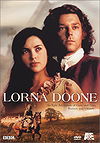 Posted : 11 years, 8 months ago on 4 August 2012 02:17
(A review of Lorna Doone)
Posted : 11 years, 8 months ago on 4 August 2012 02:17
(A review of Lorna Doone)I can't stop raving about this movie. When it aired on A&E I was glued to my television set for three hours. I have rarely found a TV movie that watchable and fascinating. I instantly loved the story, and not long after bought a copy of the R.D. Blackmore classic novel. The actors became the characters, so much so that you forgot they were just acting.
Everything about this film is superb. The story of a young man, John Ridd, from a farming family in the southwest England in the 1600s who watches as his beloved father is murdered in cold blood by the infamous aristocratic Doone clan, who terrorize the countryside. He grows into manhood determined to seek revenge, only to fall in love with the lovely Lorna Doone, and to come to blows with the violent and controlling Carver Doone who is betrothed to Lorna and will stop at nothing to possess her. The feud between the two families leads to consequences, as does the political intrigue gripping Britain at that time. The opposition towards the Catholic James II inheriting the throne and the illegitimate Duke Of Monmouth's attempts to have the title of King for himself whips the country into a frenzy.
The costumes, locations, hairstyles, production design, dialogue and music are all top-notch, and the performers are all outstanding. It's not just a beautifully shot love story, but it is also full of fast-paced action, humor, intrigue, and drama. Amelia Warner fits the bill as Lorna, her exquisite beauty, fantastic presence, vulnerability and strength embodying her character wonderfully. Richard Coyle, rugged and handsome, is right on in his portrayal of John, a young man torn between his loyalty to his family and the memory of his father, and his love for this young beauty whom he knows is nothing like her vicious family. And the gorgeously roguish Aidan Gillen (I have a thing for Irish guys) is magnetic, strangely seductive and hypnotic as the obsessive, power-hungry Carver, who claims Lorna as his, and who wants all the power, all the while possessing a degree of vulnerability. When the story takes a twist regarding Lorna's true parentage, the film becomes even more engrossing as the viewer becomes more and more invested. What will happen? Will love conquer all? The smaller characters, from the Doones to the Ridds and the neighboring folk, to the nobility, King's army, royalty and the very real historical figure Judge Jeffreys, give the film a scope and adds authenticity to the story. All the people I have shared this movie with have enjoyed it, and have complimented the music, a lovely mixture of folk and Celtic melodies, and the wonderfully lush, green landscape and the design of the houses, cottages, and castles. In short, you feel like you are there, not that you are watching a movie. It all seems so real, making it a marvellous experience. It is a masterpiece! Romantics, take note.
Everything about this film is superb. The story of a young man, John Ridd, from a farming family in the southwest England in the 1600s who watches as his beloved father is murdered in cold blood by the infamous aristocratic Doone clan, who terrorize the countryside. He grows into manhood determined to seek revenge, only to fall in love with the lovely Lorna Doone, and to come to blows with the violent and controlling Carver Doone who is betrothed to Lorna and will stop at nothing to possess her. The feud between the two families leads to consequences, as does the political intrigue gripping Britain at that time. The opposition towards the Catholic James II inheriting the throne and the illegitimate Duke Of Monmouth's attempts to have the title of King for himself whips the country into a frenzy.
The costumes, locations, hairstyles, production design, dialogue and music are all top-notch, and the performers are all outstanding. It's not just a beautifully shot love story, but it is also full of fast-paced action, humor, intrigue, and drama. Amelia Warner fits the bill as Lorna, her exquisite beauty, fantastic presence, vulnerability and strength embodying her character wonderfully. Richard Coyle, rugged and handsome, is right on in his portrayal of John, a young man torn between his loyalty to his family and the memory of his father, and his love for this young beauty whom he knows is nothing like her vicious family. And the gorgeously roguish Aidan Gillen (I have a thing for Irish guys) is magnetic, strangely seductive and hypnotic as the obsessive, power-hungry Carver, who claims Lorna as his, and who wants all the power, all the while possessing a degree of vulnerability. When the story takes a twist regarding Lorna's true parentage, the film becomes even more engrossing as the viewer becomes more and more invested. What will happen? Will love conquer all? The smaller characters, from the Doones to the Ridds and the neighboring folk, to the nobility, King's army, royalty and the very real historical figure Judge Jeffreys, give the film a scope and adds authenticity to the story. All the people I have shared this movie with have enjoyed it, and have complimented the music, a lovely mixture of folk and Celtic melodies, and the wonderfully lush, green landscape and the design of the houses, cottages, and castles. In short, you feel like you are there, not that you are watching a movie. It all seems so real, making it a marvellous experience. It is a masterpiece! Romantics, take note.
 0 comments, Reply to this entry
0 comments, Reply to this entry
The Return of the Native review
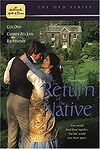 Posted : 11 years, 8 months ago on 30 July 2012 03:12
(A review of The Return of the Native)
Posted : 11 years, 8 months ago on 30 July 2012 03:12
(A review of The Return of the Native)I caught the first half hour of this when it originally aired on CBS in 1994, but as I was a teenager I did not know of Thomas Hardy's work, nor did I recognize Catherine Zeta-Jones or Clive Owen as they were both unknown in North America at the time. I have since taken a liking to watching period films and reading the classic novels upon which they are based. I have read the novel of The Return of the Native several times; it is one of my favorite Hardy novels, but I couldn't help but notice some similarities to Emily Bronte's Wuthering Heights, similarities that are evident in the film as well. Wind-swept moors, a headstrong, misguided heroine who marries a kind-hearted but dull gentleman for opportunity and possibility of society acceptance yet she maintains her strong connection to the brooding, roguish man who is tormented by the spell she casts. Spell, of course, used as a figure of speech, although raven-haired Eustacia Vye (Zeta-Jones) is suspected to be a witch and shunned by the locals of Egdon Heath, since her effect on men seems to have some kind of bewitching quality in their eyes. Even though Damon Wildeve (Owen) is pledged to marry the fair Thomasin Yeobright (Claire Skinner), he cannot seem to shake his feelings for Eustacia, who keeps drawing him to her with her bonfires and her indecision to leave England with him. As much as she wants to escape from Egdon, she feels that somehow Wildeve is beneath her, so when Thomasin's cousin Clym (Ray Stevenson) returns from Paris, she immediately sets her sights on him and leaves Damon in the dust. He, in turn, marries Thomasin almost out of spite, hoping to hurt Eustacia, but she only pushes forward with her plan to win Clym's heart, wed him and hoping that he will take her away from the heath she despises so much. However, with Hardy, things rarely the work out the way his characters hope - Clym wants to stay in Wessex, to open a school and live simply, which only brings his wife to despair and boredom. She begins to wonder if she made a mistake, and re-encountering her former lover only cements her confusion. She is somewhat torn, and this ultimately brings on her downfall as well as Damon's. Other notable portrayals are Steven MackIntosh as reddleman Diggory Venn, who unselfishly loves Thomasin and will do anything to see her happy; his character is both honorable and down-to-earth yet possesses a kind of unworldly knowledge about what he sees around him. And the ever reliable Joan Plowright as Clym's mother turns in yet another wonderful performance. Of course, there are liberties taken (cause of death of Mrs. Yeobright is altered, omission of Damon and Thomasin's child, inclusion of more of the novel's text would have been good at the climax), but overall, for the running time, Hallmark did a commendable job with this presentation. The characters of Eustacia, Wildeve, Diggory and even Thomasin have always held more interest for me than Clym, who in my opinion was never a very compelling character to begin with, sort of like Edgar Linton. Stevenson, also a virtual unknown at the time, does well with his pretty much thankless role - I never really understood what Eustacia saw in him other than her plans for escape and maybe his idealism, but Damon was a far better match for her. With Clym, she sees what she wants to see, whereas with Damon the reality is something that she doesn't know if she wants to see (there has to be some symbolism of Clym losing his sight). Of course, Eustacia and Damon are the most tragic, and are doomed, not only because they are both outsiders and their relationship to each other (which would be considered scandalous in Victorian England), but their desire to escape is only achieved in death. One of the complaints I have about this production is how there was none of the novel's dialogue when Eustacia takes her fatal plunge and Wildeve's ill-fated attempt to rescue her were included.
Filmed in Exmoor National Park (rather than in Dorset), the location does make the setting seem more rugged and wild, the music is very emotional and romantic, the cinematography very lush and pretty, Zeta-Jones is costumed more colorfully than the other women, no doubt to make to make her more distinctive (but her beauty does that alone). Very good supporting cast also. And I have to say, I cannot picture anyone else but Catherine and Clive in the roles, even when I read the novel. It's worth seeing for them and the landscape alone!
Filmed in Exmoor National Park (rather than in Dorset), the location does make the setting seem more rugged and wild, the music is very emotional and romantic, the cinematography very lush and pretty, Zeta-Jones is costumed more colorfully than the other women, no doubt to make to make her more distinctive (but her beauty does that alone). Very good supporting cast also. And I have to say, I cannot picture anyone else but Catherine and Clive in the roles, even when I read the novel. It's worth seeing for them and the landscape alone!
 0 comments, Reply to this entry
0 comments, Reply to this entry
Tess of the D'Urbervilles review
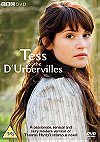 Posted : 11 years, 8 months ago on 30 July 2012 02:09
(A review of Tess of the D'Urbervilles)
Posted : 11 years, 8 months ago on 30 July 2012 02:09
(A review of Tess of the D'Urbervilles)That haunting song has been stuck in my head ever since I saw this four-part BBC miniseries. It was a stroke of genius to incorporate this folk tune into the soundtrack (composed by Rob Lane), which sums up the mood and aura of this tragic tale of a young woman wronged so unjustly by two men. Gemma Arterton is wonderful as Tess Durbeyfield, probably Thomas Hardy's most well-loved heroine, exploited by her ignorant parents into claiming noble heritage and discarded by 19th century society. Hans Matheson is Alec Stoke-d'Urberville, the wealthy cad who violates her, unknowingly impregnates her with a child who doesn't survive babyhood and later comes back into her life as a supposedly reformed preacher. Eddie Redmayne is Angel Clare, the seemingly kind-hearted and tolerant parson's son who wins Tess's love but proves to be just as hypocritical as his religious family and his actions bring Tess to despair. As in most Hardy tales, tragedy looms a large shadow over the lives of his characters.
Arterton's Tess is matched perfectly by Matheson's Alec, who is given more depth than any of the earlier film adaptations. The dark and tormented essence gives you the sense how doomed these two characters really are - their actions and words toward each other leads to their downfall. Unfortunately, the same cannot be applied to Redmayne's Angel, who looks befuddled and lost more than half the time. There is a rushed directorial pace in the second installment that hurts the romantic appeal between Tess and Angel, and the love story element seems a bit forced as a result. Because of that, I didn't get the appeal of Angel in this one, or why Tess and her fellow dairymaids were in love with him, or why Tess takes the desperate course of action in order to get him back. Some of the modern dialogue used did take away from the affect of the story, and Redmayne seemed to have a hard time keeping up with Arterton performance-wise. Redmayne redeemed himself somewhat in the final episode but for the most part I was unimpressed with him. However, director David Blair must take some of the criticism, as the hurried scenes to establish the "romance" seemed to skim over the parts of the novel that gave the lovers the attachment to one another that eventually leads Angel to see the error of his ways and beg his wife's forgiveness. I was anticipating Alec's return so much that I found myself not really caring if Angel came back for Tess or not. In sharp contrast, the 1998 A&E/London Weekend Television production had me rooting for Tess and Angel's reunion even though I was aware of the outcome. I was so taken by Angel in that one, whereas here I found nothing in him to be slightly attractive or romantic. I sympathized with Tess completely and neither man deserved her, but at least in the other version and the novel I could see why she loved Angel and longed for him to return to her. I found myself almost rooting for Alec (I never thought I'd say that), because Matheson was so compelling and magnetic and he and Arterton generated such electricity, I couldn't take my eyes off them. Alec's fleeting conversion to Christianity and his sermon in the tent that Tess stumbles upon is foreshadowing of the path these two ill-fated characters will end up on. The moment he lays eyes on her again, his fatal attraction and twisted love for her resurfaces and consumes him, and Tess finds herself increasingly helpless to refuse his help after her father dies and her family is left destitute. Alec's wealth is the only way he can possess her and he is aware of that, but he is willing to get her the only way he can, only to discover that fate does indeed play a vengeful hand. It was also nice to see Tess revisiting her child's grave and placing fresh flowers upon it; her deeply felt sense of loss and rejection by both the church and her village is searingly devastating because it becomes all the more clear that she is victim of both society (in which women had few advantages) and fate. Having said that, Tess and Angel's reunion did not have the emotional impact it should have had, the sex scene was unnecessary, but the Stonehedge sequence was an emotional powerhouse for Arterton, as was the climax of her walking off to her fate with her signature tune heard wistfully in the background. The supporting cast was in top form, and while the cinematography was lovely, it could have emphasized far more considering how important landscape is in Hardy's work, as both the 1998 two part program and Roman Polanski's 1979 film have demonstrated. As a four-part miniseries, it had the opportunity to include more scenes from the novel and insight into character, particularly Angel, which would have helped the plot a great deal. However, it was good to see the mausoleum scene and the ending was heartbreaking and moving, although my tears were for Tess, her sister Liza-Lu, and, dare I say it, even Alec, but I felt nothing for Angel (although Redmayne's tearful breakdown was by far his best moment).
On the whole, this was a very good presentation, my second favorite version and very much worth seeing. Arterton and Matheson give tour-de-force portrayals; it would be great if they would co-star again, some have suggested as Cathy and Heathcliff in "Wuthering Heights" - I could definitely see that. And that song will linger on in your memory long after the final credits have rolled, as will the rest of the score.
Arterton's Tess is matched perfectly by Matheson's Alec, who is given more depth than any of the earlier film adaptations. The dark and tormented essence gives you the sense how doomed these two characters really are - their actions and words toward each other leads to their downfall. Unfortunately, the same cannot be applied to Redmayne's Angel, who looks befuddled and lost more than half the time. There is a rushed directorial pace in the second installment that hurts the romantic appeal between Tess and Angel, and the love story element seems a bit forced as a result. Because of that, I didn't get the appeal of Angel in this one, or why Tess and her fellow dairymaids were in love with him, or why Tess takes the desperate course of action in order to get him back. Some of the modern dialogue used did take away from the affect of the story, and Redmayne seemed to have a hard time keeping up with Arterton performance-wise. Redmayne redeemed himself somewhat in the final episode but for the most part I was unimpressed with him. However, director David Blair must take some of the criticism, as the hurried scenes to establish the "romance" seemed to skim over the parts of the novel that gave the lovers the attachment to one another that eventually leads Angel to see the error of his ways and beg his wife's forgiveness. I was anticipating Alec's return so much that I found myself not really caring if Angel came back for Tess or not. In sharp contrast, the 1998 A&E/London Weekend Television production had me rooting for Tess and Angel's reunion even though I was aware of the outcome. I was so taken by Angel in that one, whereas here I found nothing in him to be slightly attractive or romantic. I sympathized with Tess completely and neither man deserved her, but at least in the other version and the novel I could see why she loved Angel and longed for him to return to her. I found myself almost rooting for Alec (I never thought I'd say that), because Matheson was so compelling and magnetic and he and Arterton generated such electricity, I couldn't take my eyes off them. Alec's fleeting conversion to Christianity and his sermon in the tent that Tess stumbles upon is foreshadowing of the path these two ill-fated characters will end up on. The moment he lays eyes on her again, his fatal attraction and twisted love for her resurfaces and consumes him, and Tess finds herself increasingly helpless to refuse his help after her father dies and her family is left destitute. Alec's wealth is the only way he can possess her and he is aware of that, but he is willing to get her the only way he can, only to discover that fate does indeed play a vengeful hand. It was also nice to see Tess revisiting her child's grave and placing fresh flowers upon it; her deeply felt sense of loss and rejection by both the church and her village is searingly devastating because it becomes all the more clear that she is victim of both society (in which women had few advantages) and fate. Having said that, Tess and Angel's reunion did not have the emotional impact it should have had, the sex scene was unnecessary, but the Stonehedge sequence was an emotional powerhouse for Arterton, as was the climax of her walking off to her fate with her signature tune heard wistfully in the background. The supporting cast was in top form, and while the cinematography was lovely, it could have emphasized far more considering how important landscape is in Hardy's work, as both the 1998 two part program and Roman Polanski's 1979 film have demonstrated. As a four-part miniseries, it had the opportunity to include more scenes from the novel and insight into character, particularly Angel, which would have helped the plot a great deal. However, it was good to see the mausoleum scene and the ending was heartbreaking and moving, although my tears were for Tess, her sister Liza-Lu, and, dare I say it, even Alec, but I felt nothing for Angel (although Redmayne's tearful breakdown was by far his best moment).
On the whole, this was a very good presentation, my second favorite version and very much worth seeing. Arterton and Matheson give tour-de-force portrayals; it would be great if they would co-star again, some have suggested as Cathy and Heathcliff in "Wuthering Heights" - I could definitely see that. And that song will linger on in your memory long after the final credits have rolled, as will the rest of the score.
 0 comments, Reply to this entry
0 comments, Reply to this entry
Love with the Proper Stranger review
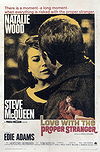 Posted : 11 years, 9 months ago on 14 July 2012 04:39
(A review of Love with the Proper Stranger)
Posted : 11 years, 9 months ago on 14 July 2012 04:39
(A review of Love with the Proper Stranger)Sweet but cynical, this Robert Mulligan film seems strangely modern despite its slightly dated plot (illegal, back-alley abortions, thank goodness that's something we no longer have to worry about). Natalie Wood, scoring her third and final Oscar nomination, and Steve McQueen, in their only on-screen pairing, shine in their realistic, touching portrayals as two working class Italian-Americans who find themselves in a dilemma after a one-night stand. Angie (Wood) is pregnant, and Rocky (McQueen), attempts to help her to pay for termination of the unwanted pregnancy. Things don't go as planned, and he finds himself in the middle of a conflict between Angie and her protective brother, Dominick (Hershal Bernardi), when Angie refuses to marry him. Although the viewer knows that they are right for each other, the pair maintain a defiance against the attraction, refusing to give into romanticism which could have turned the film into a forgettable, sappy love story. Their naturalistic and cynical views on love and marriage give this movie the bite and redeeming qualities that keeps it afloat. Strikingly photographed in black and white, against the gritty New York backdrop, with wonderful, elegant but simple costumes by Edith Head, Wood and McQueen both give perhaps the best performances of their careers. Bernardi, as Angie's overprotective brother, is a lovable annoyance, while Tom Bosley, as Angie's would-be suitor, Columbo, brings an endearing comic relief (clumsy!), and his sisters and that mother of his - classic Italian mama! The same can be said for Angie's occasionally hysterical, traditional, guilt-inducing mother - "Go and be a mother in America! Day and night you watch her, day and night! You take her here, you meet her there, you wait all day, afraid that some lunatic might grab her in the street!" Or, my personal favorite, "Yes, in my grave, I'm going to rest!" Edie Adams, billed third but in a rather small (but showy) role, is fantastic as the showgirl Barb, in her classic early 60s apartment and her little doggies - great reaction expression when she finds Angie using her shower!
Gently scored by Elmer Bernstein, the little radio rendition we briefly hear in the warehouse sequence "I could fall in love with the proper stranger, if I heard the bells and banjos ring . . . . . . .", which gives the plot another boost, letting the leads subtly spark off one another as they discuss the cliché of love. "Oh, how they build things up - in the books and all the movies - 'how the world comes to an end the moment your lips touch mine' - how they brainwash you." Natalie's large, luminous eyes draw the viewer in, as does Steve's tough-guy vulnerability, which Angie exposes, with her charming line, "You know, if you didn't try so hard to play against it, you could be a pretty decent kind of a person."
Love does win out, in a rather unconventional but fabulous climax - it's utterly right and I'm amazed that this film is becoming difficult to find and has never really gotten the recognition it deserves. A DVD print needs to be commercially available - VHS copies seem to be disappearing.
And remember - better wed than dead!
Gently scored by Elmer Bernstein, the little radio rendition we briefly hear in the warehouse sequence "I could fall in love with the proper stranger, if I heard the bells and banjos ring . . . . . . .", which gives the plot another boost, letting the leads subtly spark off one another as they discuss the cliché of love. "Oh, how they build things up - in the books and all the movies - 'how the world comes to an end the moment your lips touch mine' - how they brainwash you." Natalie's large, luminous eyes draw the viewer in, as does Steve's tough-guy vulnerability, which Angie exposes, with her charming line, "You know, if you didn't try so hard to play against it, you could be a pretty decent kind of a person."
Love does win out, in a rather unconventional but fabulous climax - it's utterly right and I'm amazed that this film is becoming difficult to find and has never really gotten the recognition it deserves. A DVD print needs to be commercially available - VHS copies seem to be disappearing.
And remember - better wed than dead!
 0 comments, Reply to this entry
0 comments, Reply to this entry
Return to Peyton Place review
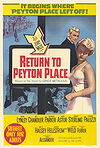 Posted : 11 years, 9 months ago on 14 July 2012 04:37
(A review of Return to Peyton Place)
Posted : 11 years, 9 months ago on 14 July 2012 04:37
(A review of Return to Peyton Place)The much anticipated sequel to the 1957 box office sensation, somewhat rests in the middle of being a success and a failure. Most lamentably, none of the cast members of the original film reprises their roles, for whatever varying reasons, nor does the original director, Mark Robson. Miscasting and changes from the novel may account for some of the movie's awkwardness, but the quality of the performances and the last scene involving the town meeting which again, exposes the truth and the bigoted views of the townspeople, elevates it above other film sequels that suffered similar blows of comparison. Conversely, the fact that entirely different locations and sets are used, also gives the movie a sense of unfamiliarity - Mamouth, California for the ski lodge scenes, Fox's Malibu Ranch and backlots for the remainder of interiors and exteriors - the rest of the footage comes from the 1959 film "The Best Of Everything" (New York) and the first movie.
Allison MacKenzie (Carol Lynley) publishes an autobiographical novel, Samuel's Castle, based on her hometown of Peyton Place and the people she knows. She becomes romantically involved with Lewis Jackman (Jeff Chandler), her married publisher. He encourages her to be as truthful as possible and never to be frightened of it. But that's not the only repercussion that her book incites - the locals are offended by the truths that Allison's tome reveals. Her mother Constance (Eleanor Parker) is both angry and fearful of both her daughter's expose and of history repeating itself, while her husband Mike Rossi (Robert Sterling) refuses to remove the book from the school library and as a result, his job as principal is put in jeopardy. It also touches Allison's friend Selena Cross (Tuesday Weld), as she begins a relationship with a ski instructor, Nils Larson (Gunnar Hellstrom), when reading aloud passages of the novel cause Selena to flashback to the night she killed her stepfather in self-defense. And Ted Carter's (Brett Halsey) marriage to the fiery Raffaela (Luciana Paluzzi) is on the rocks thanks to his meddlesome, evil mother Roberta (Mary Astor), whose bigoted view of her daughter-in-law and determination to keep her son in her clutches has tragic consequences. Conflict ensues as Allison achieves literary fame and Connie's need to control her daughter surfaces yet again, climaxing in a showdown during a town forum in which the truth is again told, much to the dismay of Roberta, who is also on a mission to keep up the facade of moralistic hypocrisy.
Astor excels as the villainous matriarch, while Parker does a great job of taking on a role made famous by Lana Turner. Chandler is sufficient support but on occasion seems lost in the shuffle, while Lynley does a commendable turn as Allison, but she cannot eclipse the fine characterization of Diane Varsi. Halsey and Paluzzi were married at the time, which may or may not have factored into the casting, since Ted's wife in the novel was a woman from Boston named Jennifer rather than being an Italian model. Hellstrom, playing a role that was originally that of a summer stock actor, is a bit out of place (although quite humorous), and his jealousy of any man in Selena's life is alarming and distracting, while Sterling is respectable as Mike, who supports Allison and stands his ground. But by far the standout performance is that of Weld, who exceeds in touching the tormented past of Selena, never more so than in the scene where the past plays out in front of her, causing her to attack her boyfriend, and later resurfacing during the meeting, confronting the locals regarding their unfair treatment of her and Allison revelations of the hidden side of Peyton Place. While Selena has a significantly smaller role than in the original (it's interesting that both Weld and Hope Lange, who originated the character of Selena, would costar the same year in the Elvis Presley vehicle "Wild In The Country"), and does not compare to Lange's portrayal, it still makes the film watchable. The lovely score of Peyton Place has had lyrics added and wonderfully sung by Rosemary Clooney, who was then married to the film's director, Jose Ferrer. Some characters were eliminated, and it's a shame since it would have been great to see what became of Norman Page, Betty Anderson, the Harringtons, Doc Swain and Mrs. Thornton. There are also several inconsistencies that do not make sense or match with the film's predecessor. Selena and Ted were just friends? They wanted to get married, and since when is Ted wealthy? What happened to him having to save for law school? Selena was raped by her stepfather at 13? No, she was graduating from high school that same year, and since when was Lucas Cross called Luke? The story is also not entirely true to the period (post WWII). Sylvia Stoddard's commentary is enjoyable and informative, especially considering that she attended the Hollywood Professional School with Weld. Watch for Bob Crane's unbilled appearance. A moderate success at the box office, Return To Peyton Place can never surpass the glory of the original, but it is intriguingly flawed, and an interesting follow-up.
Allison MacKenzie (Carol Lynley) publishes an autobiographical novel, Samuel's Castle, based on her hometown of Peyton Place and the people she knows. She becomes romantically involved with Lewis Jackman (Jeff Chandler), her married publisher. He encourages her to be as truthful as possible and never to be frightened of it. But that's not the only repercussion that her book incites - the locals are offended by the truths that Allison's tome reveals. Her mother Constance (Eleanor Parker) is both angry and fearful of both her daughter's expose and of history repeating itself, while her husband Mike Rossi (Robert Sterling) refuses to remove the book from the school library and as a result, his job as principal is put in jeopardy. It also touches Allison's friend Selena Cross (Tuesday Weld), as she begins a relationship with a ski instructor, Nils Larson (Gunnar Hellstrom), when reading aloud passages of the novel cause Selena to flashback to the night she killed her stepfather in self-defense. And Ted Carter's (Brett Halsey) marriage to the fiery Raffaela (Luciana Paluzzi) is on the rocks thanks to his meddlesome, evil mother Roberta (Mary Astor), whose bigoted view of her daughter-in-law and determination to keep her son in her clutches has tragic consequences. Conflict ensues as Allison achieves literary fame and Connie's need to control her daughter surfaces yet again, climaxing in a showdown during a town forum in which the truth is again told, much to the dismay of Roberta, who is also on a mission to keep up the facade of moralistic hypocrisy.
Astor excels as the villainous matriarch, while Parker does a great job of taking on a role made famous by Lana Turner. Chandler is sufficient support but on occasion seems lost in the shuffle, while Lynley does a commendable turn as Allison, but she cannot eclipse the fine characterization of Diane Varsi. Halsey and Paluzzi were married at the time, which may or may not have factored into the casting, since Ted's wife in the novel was a woman from Boston named Jennifer rather than being an Italian model. Hellstrom, playing a role that was originally that of a summer stock actor, is a bit out of place (although quite humorous), and his jealousy of any man in Selena's life is alarming and distracting, while Sterling is respectable as Mike, who supports Allison and stands his ground. But by far the standout performance is that of Weld, who exceeds in touching the tormented past of Selena, never more so than in the scene where the past plays out in front of her, causing her to attack her boyfriend, and later resurfacing during the meeting, confronting the locals regarding their unfair treatment of her and Allison revelations of the hidden side of Peyton Place. While Selena has a significantly smaller role than in the original (it's interesting that both Weld and Hope Lange, who originated the character of Selena, would costar the same year in the Elvis Presley vehicle "Wild In The Country"), and does not compare to Lange's portrayal, it still makes the film watchable. The lovely score of Peyton Place has had lyrics added and wonderfully sung by Rosemary Clooney, who was then married to the film's director, Jose Ferrer. Some characters were eliminated, and it's a shame since it would have been great to see what became of Norman Page, Betty Anderson, the Harringtons, Doc Swain and Mrs. Thornton. There are also several inconsistencies that do not make sense or match with the film's predecessor. Selena and Ted were just friends? They wanted to get married, and since when is Ted wealthy? What happened to him having to save for law school? Selena was raped by her stepfather at 13? No, she was graduating from high school that same year, and since when was Lucas Cross called Luke? The story is also not entirely true to the period (post WWII). Sylvia Stoddard's commentary is enjoyable and informative, especially considering that she attended the Hollywood Professional School with Weld. Watch for Bob Crane's unbilled appearance. A moderate success at the box office, Return To Peyton Place can never surpass the glory of the original, but it is intriguingly flawed, and an interesting follow-up.
 0 comments, Reply to this entry
0 comments, Reply to this entry
Movies
Favorite - View all |
 My movies page My movies page Rated 844 movies Rated 844 movies |
TV
Favorite - View all |
 My tv page My tv page Rated 101 tv Rated 101 tv |
Books
Favorite - View all |
 My books page My books page Rated 95 books Rated 95 books |
Favorite Authors
Victoria Holt, Susan Howatch, Emily Bronte, Phyllis A. Whitney, Charlotte Bronte, Harper Lee, Mary Stewart, Thomas Hardy, Cheryl Crane, Raymond Chandler, Anne Bronte, Megan Abbott, George Eliot, Edith Wharton, Margaret Atwood, Wilkie Collins, Mary Elizabeth Braddon, F. Scott Fitzgerald, Margaret Mitchell, Vera Caspary, Dorothy B. Hughes, V.C. Andrews, Velda Johnston, Daphne Du Maurier, L.M. Montgomery, James Ellroy, Judy Blume, Alice Munro
DVDs
Top rated |
 My dvds page My dvds page Rated 23 dvds Rated 23 dvds |
My feed
Noirdame added 8 items to their collection
4 months ago
Noirdame added 13 items to their collection
5 months ago
Noirdame added 10 items to their collection
1 year, 3 months ago
Noirdame added 10 items to their collection
1 year, 6 months ago
Noirdame added 4 items to their collection
1 year, 9 months ago
Noirdame added 9 items to their collection
2 years, 1 month ago
Noirdame added 4 items to their collection
2 years, 3 months ago
Noirdame added 42 items to their collection
2 years, 3 months ago
Noirdame added 4 items to their collection
2 years, 6 months ago
Noirdame added 5 items to their collection
2 years, 9 months ago
Noirdame added 6 items to their collection
2 years, 11 months ago
 Login
Login
 Message
Message
 Home
Home 15 Lists
15 Lists 8 Reviews
8 Reviews Collections
Collections





















































































































www.youtube.com/watch?v=dpALfJ1W0io&feature=youtu.be
It will mean so much to me if you'd watch it!
www.listal.com/list/wish-around-back-then-ginger